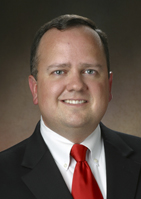© 2012 The Texas Lawbook.
By Janet Elliott
Staff Writer for The Texas Lawbook
Lubbock lawyer John E. Gibson will get his day in court to argue that he has a First Amendment right to publish a blog under the domain name of “texasworkerscomplaw.com,” the 5th U.S. Circuit Court of Appeals ruled this week.
The court reversed U.S. District Judge Sam Cumming’s dismissal of Gibson’s lawsuit, which Gibson filed after he received a letter from the Texas Department of Insurance requesting that he no longer use the domain name. The Division of Workers’ Compensation claimed his website violated the Texas Labor Code, which prohibits advertisements and business activity using the words “Texas Workers Compensation” or similar terms.
The court, in an opinion by Judge Edith Brown Clement, said the blog is not inherently misleading to the public.
“Because Texas has made no serious attempt to justify this regulation as narrowly tailored to a substantial state interest, the district court’s order dismissing Gibson’s as-applied challenge was in error, and this case is remanded to allow Texas the opportunity to develop additional factual findings to support the statute’s constitutionality,” Clement said.
Robert Hogan, who represents Gibson, says Gibson’s blog contained commentary on recent decisions by the workers’ compensation appeals panel and judicial opinions.

“It was designed for legal practitioners and citizens as an education resource to help learn more about the law,” Hogan said. “He has his own marketing website; this was just the informational side of his outreach.”
The case has potential to impact other lawyers who write blogs.
“There are broader issues concerning what degree of First Amendment protection applies to lawyers’ blogs because there’s no clear delineation from any court of appeals as to whether lawyers’ blogs should be treated as commercial speech and get a reduced degree of First Amendment protection, or whether they deserve a higher degree of protection because of their inherent non-commercial nature,” said Hogan of Lubbock’s Hogan Law Firm.
Clement was joined by Judge James L. Dennis. Senior Judge Thomas Reavley concurred in the judgment but disagreed that the statute prohibits deceptive commercial speech.
The panel noted that the law regarding the type of protection afforded domain names is in its infancy.
“As with many new issues involving the Internet, the proper method of analysis to determine whether a domain name is commercial speech or a more vigorously protected form of speech is res nova,” said Clement. “A domain name, which in itself could qualify as ordinary communicative speech, might qualify as commercial speech if the website itself is used almost exclusively for commercial purposes.”
Clement said the court need not decide that issue without a trial record.
Gibson has taken down his blog in the face of potential fines of $5,000 per violation per day, said Hogan.
The Texas Labor Code provision was enacted in 2007. Hogan said the statute even prohibits lawyers like Gibson who are certified in workers compensation law by the Texas Board of Legal Specialization from listing that achievement on their letterhead or resume.
“If you’re a lawyer or judge or doctor in Texas, you cannot use the words ‘Texas’ and ‘Workers Compensation’ together in the same pamphlet or business activity,” Hogan said.
The insurance department was represented by Assistant Solicitor General James Sullivan.
Law firm marketing expert Mike Androvett said a Texas law firm can’t market only its domain name because advertising rules require the firm name be identified on the home page.
Androvett, founder of Androvett Legal Media, said the trend of lawyers wanting expertise-related domain names has waned over the past decade.
“Search engine technology and practices have evolved, so there are other practices and features of a website that have more impact on where a website shows up on a search listing than merely the domain name,” he said.
© 2012 The Texas Lawbook. Content of The Texas Lawbook is controlled and protected by specific licensing agreements with our subscribers and under federal copyright laws. Any distribution of this content without the consent of The Texas Lawbook is prohibited.
